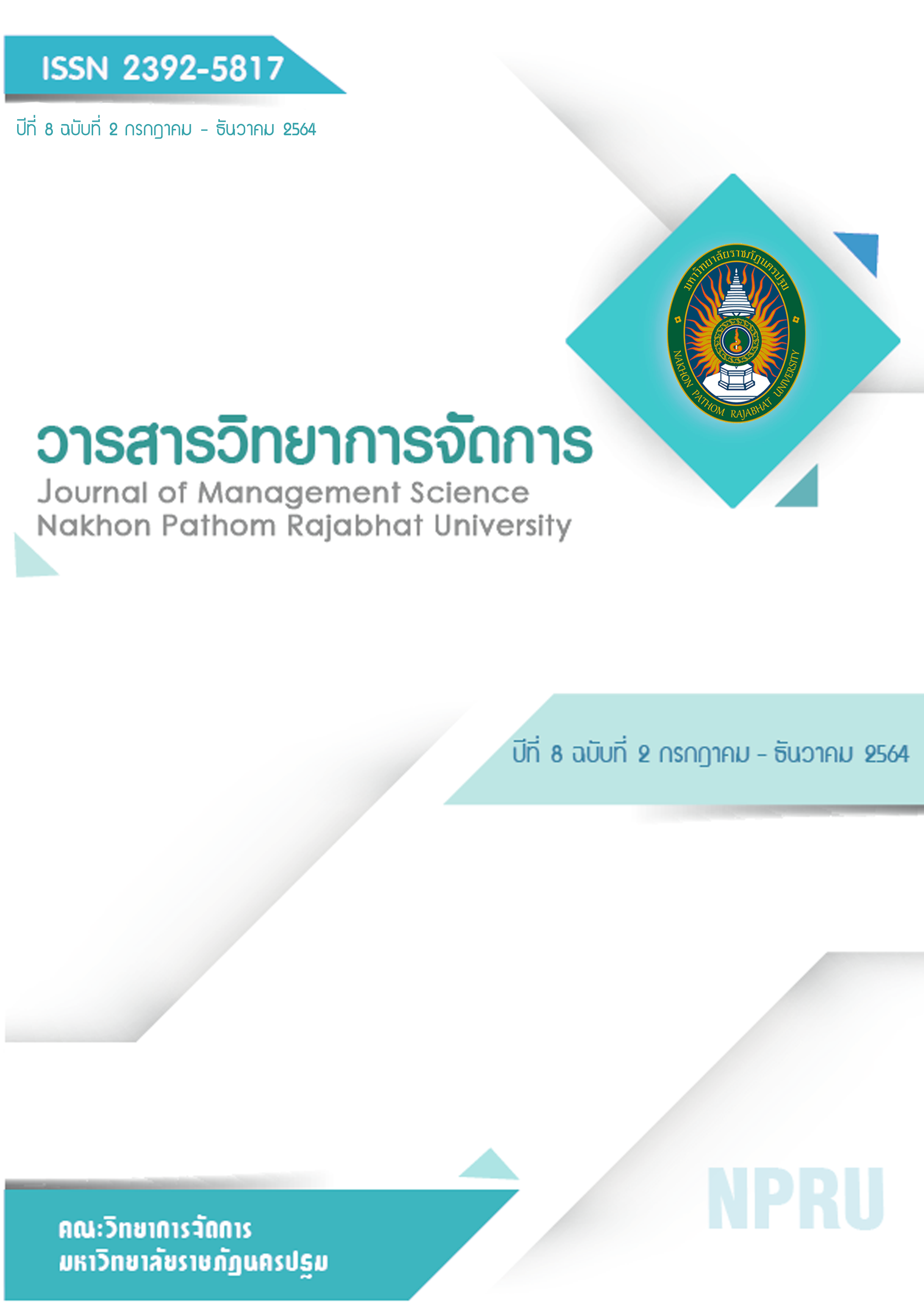Factors Affecting The Quality of Work Life of Personnel in The Department of Employment, Ministry of Labour
Main Article Content
Abstract
The objective of this research was to compare factors affecting the quality of work of personnel in the Department of Employment, Ministry of Labour that classified by individual factors of personnel. This research was quantitative research. The population was 1,258 people and a multistage sampling was performed from the calculations of the formula of Krejcie and Morgan that a sample group consisted of 300 people. A questionnaire used as a tool for collecting data. The statistics used for data analysis were frequency, percentage, mean, standard deviation, t-test, and One- Way ANOVA.
The result indicated that the comparison of factors affecting the quality of work life of personnel in the Department of Employment, Ministry of Labour: concluded that the overall was not different at statistically significant .05, except, regarding the fair and reasonable compensation, opinions differed on education level and monthly income: environmental hygiene and safety have different opinions about sex: job progress and security, there are different opinions on sex: and in social performance, differing opinions on monthly income. In terms of human competence development, social integration, work regulations and work-life balance, there was no statistically significant difference at .05 level.
Article history : Received 9 March 2021
Revised 4 April 2021
Accepted 7 April 2021
SIMILARITY INDEX = 6.96 %
Article Details

This work is licensed under a Creative Commons Attribution-NonCommercial-NoDerivatives 4.0 International License.
The views and opinions of the article appearing in this journal are those of the author. It is not considered a view and responsibility of the editorial staff.
References
กรมการจัดหางาน กระทรวงแรงงาน. (2563).จำนวนสมาชิกในกรมการจัดหางาน กระทรวงแรงงาน. [ออนไลน์]. สืบค้นเมื่อ 27 มกราคม 2563, จากhttps://www.doe.go.th/prd/main/
weblink/param/site/1/cat/43/sub/0/pull/category/view/list-label
กุณฑิกา สงวนศักดิ์ศิริ. (2559). รูปแบบการจัดการความรู้ของจุฬาลงกรณ์มหาวิทยาลัย. ดุษฎีนิพนธ์ปรัชญาดุษฎีบัณฑิต, มหาวิทยาลัยรามคำแหง.
จิรศักดิ์ จิยะจันทน์. (2563). การบริหารองค์การที่มีผลต่อแรงจูงใจในการปฏิบัติงานของพนักงานสายงานปฏิบัติการนครหลวง บริษัทไปรษณีย์ไทย จำกัด. วารสารสังคมศาสตร์และมานุษยวิทยาเชิงพุทธ, 5(1), 240-253.
ดาวรุ่งรตา วงษ์ไกร. (2563). การบริหารจัดการองค์การที่มีผลต่อคุณภาพชีวิตการทำงานตามมาตรการเฝ้าระวังป้องกันและควบคุมการแพร่ระบาดโรคไวรัสโคโรนา 2019 (COVID-19) ของบุคลากร สำนักงานหลักประกันสุขภาพสาขาเขตพื้นที่ 13 กรุงเทพมหานคร. วารสารวิทยาการจัดการ มหาวิทยาลัยราชภัฏนครปฐม,7(2), 257-269.
ธวัชชัย ชมภูมาศ. (2561). การบริหารความขัดแย้งของผู้บริหารสถานศึกษา สังกัดสำนักงานเขตพื้นที่การศึกษามัธยมศึกษา เขต 29. วิทยานิพนธ์มหาบัณฑิต, มหาวิทยาลัยราชภัฏอุบลราชธานี
นวรัตน์ ณ วันจันทร์. (2558). คุณภาพชีวิตการทำงานของข้าราชการกรมการปกครองจังหวัดลำพูน. วิทยานิพนธ์รัฐประศาสนศาสตรมหาบัณฑิต มหาวิทยาลัยเชียงใหม่.
นิวัฒน์ รังสร้อย และพีระพงษ์ วรภัทร์ถิระกุล. (2563). การพัฒนาโครงสร้างพื้นฐานโดยใช้ความร่วมมือระหว่างภาครัฐและเอกชนในพื้นที่อำเภอบางบัวทอง จังหวัดนนทบุรี. วารสารมหาจุฬานครทรรศน์, 7(10), 142-153.
พภัสสรณ์ วรภัทร์ถิระกุล. (2562). แรงจูงใจในการปฏิบัติงานของบุคลากรที่มีต่อการบริหารสำนักงานหลักประกันสุขภาพแห่งชาติ สาขาเขตพื้นที่ 13 (กรุงเทพมหานคร). วารสารมหาจุฬานาครทรรศน์, 6(1), 486-498.
พิชญา แก้วสระแสน และไพบูลย์ อาชารุ่งโรจน์ (2560). ความสัมพันธ์ระหว่างปัจจัยในการทำงาน ความเครียด และประสิทธิภาพในการปฏิบัติงานของพนักงานบริษัทอสังหาริมทรัพย์ในกรุงเทพมหานคร. วารสารมนุษยศาสตร์ สังคมศาสตร์และศิลปะ , 11(2), 1042 - 1056.
มาริสสา อินทรเกิด และวิโรจน์ เจษฏาลักษณ์. (2559). การรับรู้การสนับสนุนจากองค์การและการรับรู้การสนับสนุนจากหัวหน้างานที่ส่งผลต่อผลการปฏิบัติงานของพนกังานสายสนับสนุนมหาวิทยาลัยเอกชนแห่งหนึ่ง. วารสารธุรกิจปริทัศน์, 8(2), 129-144.
รัตติกรณ์ จงวิศาล. (2556). ภาวะผู้นำทฤษฎี การวิจัย และแนวทางสู่การพัฒนา. กรุงเทพฯ : จุฬาลงกรณ์มหาวิทยาลัย.
รังสรรค์ ประเสริฐศรี (2556). พฤติกรรมองค์การ. กรุงเทพ : สยามบุคส์.
ลัดดาวัลย์ เพชรโรจน์ และอัจฉรา ชานิประศาสน์. (2545). ระเบียบวิธีการวิจัย. กรุงเทพฯ:พิมพ์ดีการ พิมพ์.
วรชัย สิงหฤกษ์ และวิโรจน์ เจษฏาลักษณ์.(2560). อิทธิพลของสภาพแวดล้อมในการทำงานที่มีต่ประสิทธิภาพการทำงาน ผ่านความผูกพันต่อองค์การของลูกจ้างสำนักพิมพ์ มหาวิทยาลัยสุโขทัยธรรมาธิราช. วารสารวิจัยและพัฒนาวไลยอลงกรณ์ ในพระบรมราชูปถัมภ์, 12(2), 203-210.
สํานักงานประกันสังคม. (2554). การสํารวจความพึงพอใจของบุคลากรสํานักงานประกันสังคม ประจําปี 2554. กรุงเทพมหานคร: ผู้แต่ง. สำนักงานกิจการโรงพิมพ์ องค์การสงเคราะห์ทหารผ่านศึก.
Balser, D. B., and Harris, M. M. (2008). Factors affecting employee satisfaction with disability accommodation: A field study. Employ Response Rights Journal, 20(1), 13-28
Cascio, W.F. (2015). Managing human resources. New York: MoGraw-Hill Book Company.
Jackson, S.E., Schuler, R.S., and Werner, S. (2009). Managing human resources. Mason, OH: South-Western Cengage Learning.
Hammer, L. B., and Sanchez, D. (2006). Quality of work life. Newbury Park, CA: Sage.
Heneman, R. L., and Schutt, W. K. (2003). Total rewards management. In S. Chowdhury (Ed.), Organization 21C: Someday all organizations will lead this way (pp. 125-126). London: Financial Times-Prentice Hall.
Krejcie, R. V. and Morgan, D. W. (1970). Determining Sample Size for Research Activities. Educational and Psychological Measurement, 30(3), 607-610.
Katzell, R.A. (2013). Work attitude motivation and performance. Professional Psychology,11(6),411-421.
Kast, F.E. and Rosengweing, I.E. (2015). Organizational and management: A system And contingency approach. (4 th ed.) New York: McGraw-Hill.
Moorhead, G., and Griffin, R. W. (2010). Organizational behavior: Managing people and organizations (9th ed.). Mason, OH: South-Western Cengage Learning.
Reddick, C. G., and Coggburn, J. D. (2008). Handbook of employee benefits and administration. New York: Taylor and Francis Group.
Trau, R. N. C., and Hartel, C. E. J. (2007). Contextual factors affecting quality of work life and career attitudes of gay men. Employ Response Rights Journal, 19, 207-219.
WorldatWork. (2007). The World at Work handbook of compensation, benefits and total rewards: A comprehensive guide for HR professionals. New York: John Wiley and Sons.


